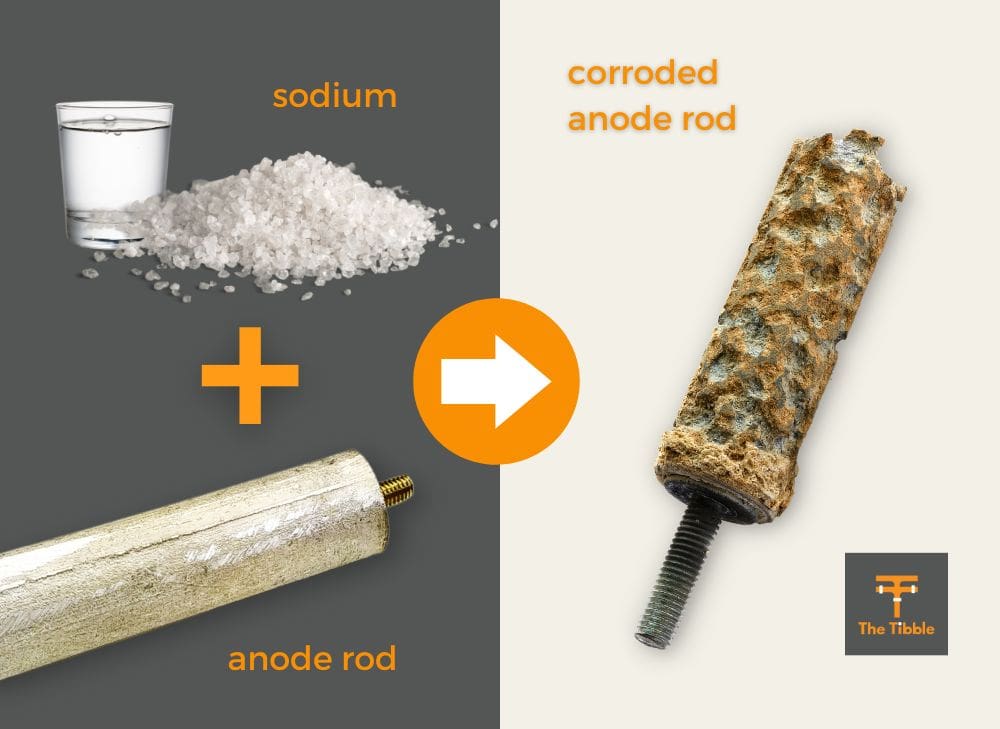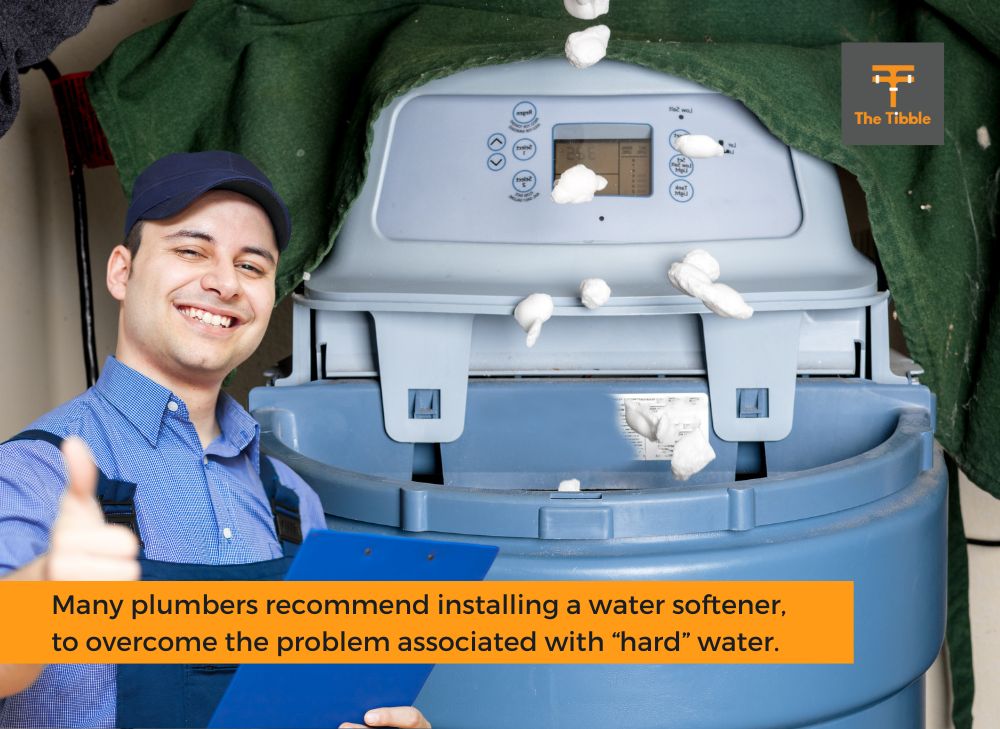Water Softener And Anode Rod: Do They Play Good Together?
Living inwards an surface area where the water is difficult as well as has high volumes of dissolved minerals can live real frustrating. To forbid the hard H2O leaving scales on every surface they affect, domicile owners resort to installing water softeners into their plumbing systems, which can crusade problems with the anode rods.
Water softeners too anode rods do non play well together. This is because the water softener replaces the hard water minerals with Sodium, as well as inwards plough, the corrosion rates of the anodes are substantially increased compared to the unsoftened, Sodium costless H2O.
The H2O softener was invented to overcome the irritation of living alongside difficult water. This ingenious device is installed at the primary water furnish to the inlet pipes as they go into the menage. The event is softer water, which is much easier to live with. However, it is non all skillful word!
Why Do Water Softeners Not Play Nicely With Anodes?
It is common noesis that metals corrode more easily inwards seawater.
Seawater (read saltwater) corrodes metal 5 times faster than fresh water.
Seawater also conducts electric current much more efficiently than fresh water.
What Does The Science Say About Water Softeners And Anodes?
To understand how corrosion of the anode occurs in addition to why corrosion occurs faster in saltwater, nosotros volition get a niggling nerdy and explain the scientific discipline behind corrosion.
Water consists of ii hydrogen molecules for every oxygen molecule (H2O).
The metallic atoms in the anode loose electrons to the available hydrogen ions in the water. This means that the anodes pass on up minor pieces (electrons) of themselves to the water.
In freshwater, although corrosion occurs, it happens at a much slower charge per unit.
This is because the electric electrical conductivity of fresh water is not as proficient every bit in salt H2O, where the salt assists conduction.
Because of this, the alone fourth dimension the anode tin unloosen the electrons is when it physically touches the hydrogen ions inward the water. As this happens irregularly, the corrosion procedure is real tiresome.
The procedure is sped up inward seawater because the salt conducts the electric electric current more successfully. So the anode does not ask to physically touch on the Hydrogen ions. The electrons are transferred over a longer distance.
So How Does That Affect Water Softeners And Anodes?
When the H2O softener replaces the Magnesium in addition to Calcium ions inwards the H2O, it replaces them with sodium ions (table salt).
The H2O softener creates the same surroundings every bit the seawater inwards the previous explanation by adding sodium ions to the H2O.

This speeds upwardly the corrosion of the anode to 5 to ten times faster than inward fresh H2O.
Therefore, it is critical that if a H2O softener is installed, the anodes inwards the water heater live checked together with perchance replaced every vi months.
Are Water Softeners Bad For Hot Water Tanks?
Having discussed this, it seems that installing a water softener is bad for hot water tanks.
This is not truthful because removing the Magnesium together with Calcium ions from the water agency that the limescale build-up is reduced, ensuring that the hot water heater remains effective for longer.
While it significantly increases the anode’s corrosion, this is a relatively pocket-size price to pay for a longer active life of the water tank.
Why Are Water Softeners Installed?
In many areas of the state, the water is “difficult.” This agency that the H2O contains high concentrations of dissolved minerals.
Calcium as well as magnesium are the near mutual minerals in water that effort H2O to live difficult; nonetheless, the next chemicals may besides be dissolved in difficult H2O.
- Aluminum
- Barium.
- Iron.
- Calcium.
- Lime.
- Manganese.
- Magnesium.
- Strontium.
- Zinc.
The outcome of the water existence “hard” are every bit follows.
- The H2O tastes different.
- The H2O may take a unique odour,
- When the automobile is washed, it leaves hard to take stains in the paintwork.
- Shower glass becomes stained.
- Difficult to remove spots or film remaining on spectacles but out of the dishwasher.
- There is a make-upwards of soap scum.
- The shower heads, faucets, and pipes become clogged.
The long-term functionality of the hot water tank is besides impacted.
The limescale construct-upward collects at the bespeak where the gas burners or electrodes work.
In gas hot H2O tanks, this is at the bottom of the tank, where it acts as an insulation layer preventing the gas burners from heating the H2O.
In electrical hot water tanks, a layer builds up on the electrode in addition to insulates the oestrus from the H2O.
In both instances, when this occurs, the hot H2O tank needs to live replaced.
How Do Water Softeners Work?
To overcome the problem associated amongst “difficult” H2O, many plumbers recommend installing a water softener.

The softener is installed at the principal water furnish every bit it enters the home.
A typical water softener arrangement operates by removing the dissolved Magnesium and Calcium ions from the water as well as replacing them amongst sodium ions.
The H2O softener has a quantity of porous plastic covered with resin.
- At the get-go of the procedure, the Sodium positive ions coat the resin surface.
- When the water flows over the surface, the Magnesium as well as Calcium ions inward the H2O stick to the resin.
- To hold the natural residue, in that location has to live some other equivalent, opposite action.
- In this case, the action is to liberate the Sodium positive ions from the resin together with into the H2O.
- The H2O containing the Sodium ions is released into the dwelling house for normal daily purpose, about of which is used to make full the water heater.
- Eventually, the resin layer inwards the water softener becomes saturated amongst the Magnesium together with Calcium ions, together with the unit of measurement will self-make clean (unremarkably overnight) by rinsing the resin layer alongside a concentrated solution of sodium chloride (common salt H2O.)
- The concentration of sodium ions in the sodium chloride reverses the procedure, together with the resin’sec calcium and magnesium ions are replaced.
- The organization automatically rinses the removed calcium too magnesium ion mixture and flushes it out of the system and into the municipal wastewater pipes.
- Once the automated cleaning process is completed, the arrangement reverts to its normal softening performance.
The procedure increases the sodium content inward each gallon of H2O flowing into the menage as well as, hence, the hot water tank past more or less 750 milligrams.
Conclusion
Installing a H2O softener increases the speed at which the anode installed inwards the hot water tank corrodes too needs replacing.
As long every bit this is carried out regularly, the benefit of a H2O softener is that it volition increase the ultimate life expectancy of the hot H2O tank.
References
https://www.scientificamerican.com/article/how-make-water-softeners-wo/
Komentar
Posting Komentar